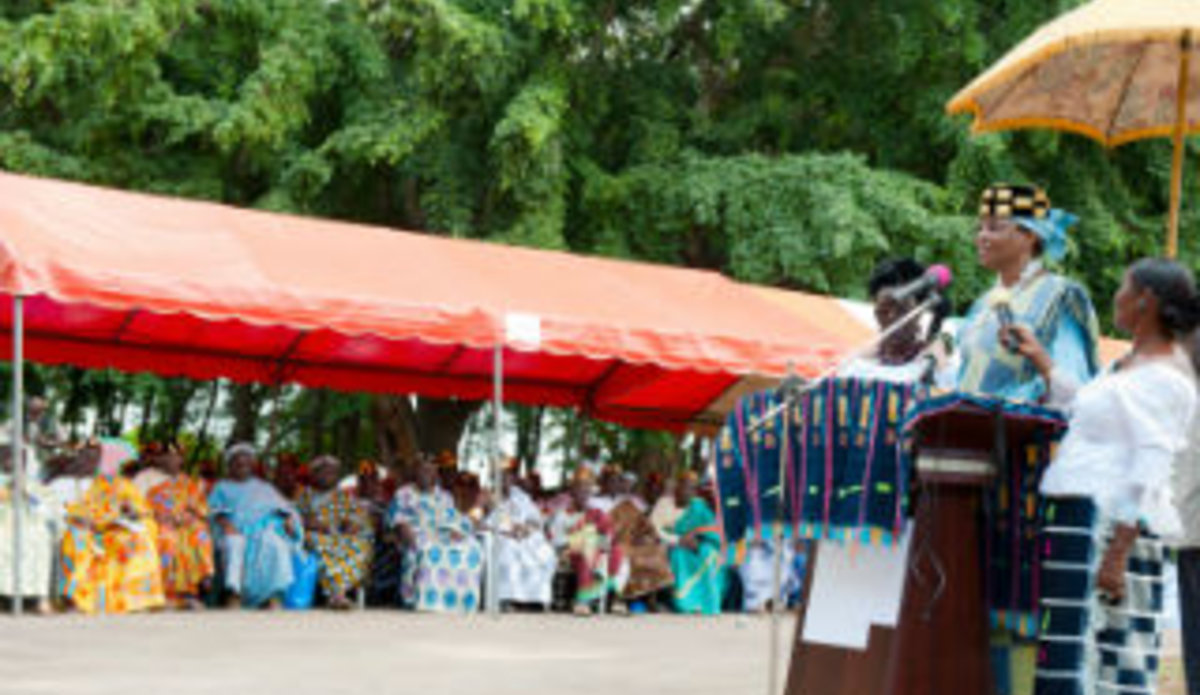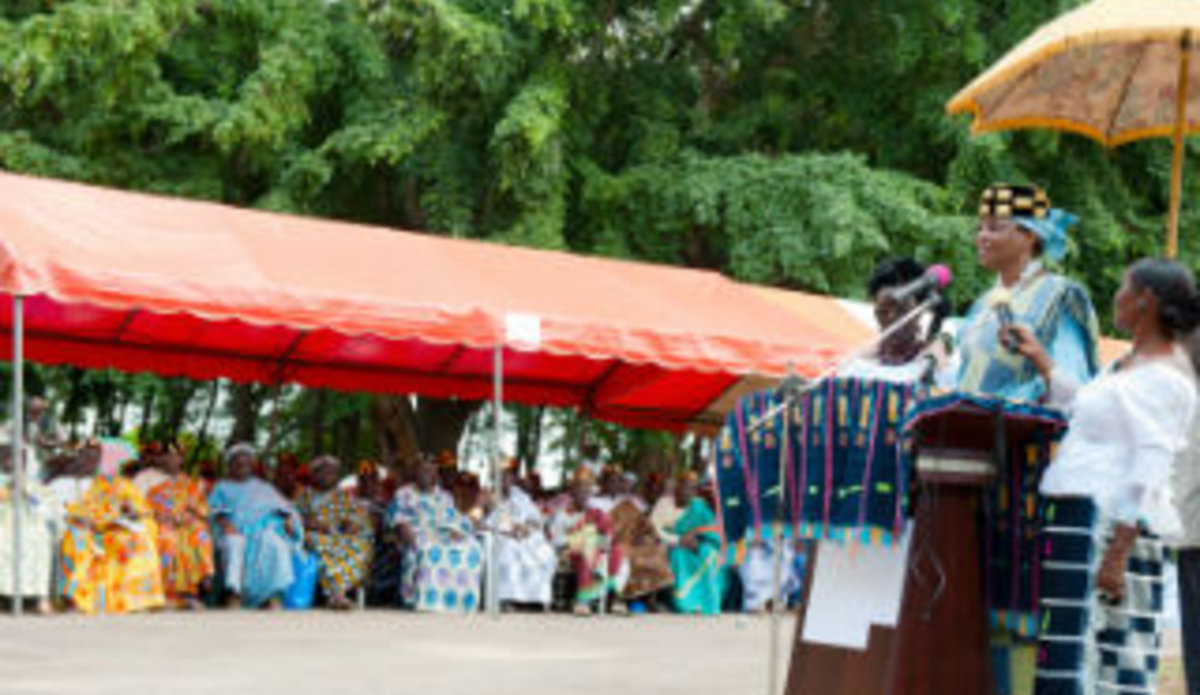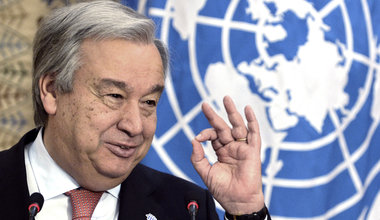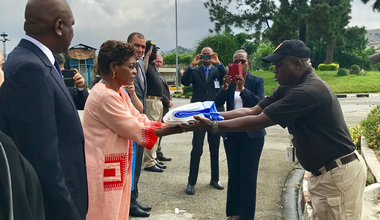Special Representative welcomes the leadership of traditional kings and chiefs in conflict resolution and reconciliation process
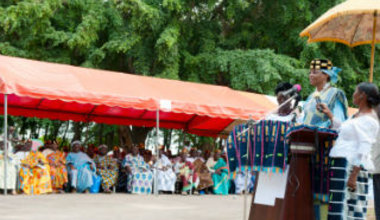
The Special Representative of the United Nations Secretary-General for Côte d'Ivoire, Aïchatou Mindaoudou, has welcomed the leadership of traditional kings and chiefs in conflict resolution and the reconciliation process in Côte d'Ivoire during her second meeting with members of the High Council of Traditional Kings and Chiefs of Côte d'Ivoire in Dimbokro, in the N'Zi region, some 250 kilometres from Abidjan.
In response to an invitation from the High Council of Traditional Kings and Chiefs of Côte d'Ivoire, Mrs Mindaoudou, on Tuesday, 12 November 2013, in Dimbokro, met with about 100 traditional chiefs from several localities in the country to discuss national reconciliation and social cohesion. The encounter was part of the Special Representative's efforts to support different sections of society in Côte d'Ivoire.
The hosts of the ceremony, which was presided over by the Prefect of N'Zi Region and Prefect of the Department, Obouo Jacques accompanied by local authorities and the people of Dimbokro, who are known as Dimbokrofouês, warmly welcomed the Chief of the United Nations Operation in Côte d'Ivoire (UNOCI) and her delegation.
"In Africa, since the mists of time, traditional chiefs have always been vectors of peace, social cohesion and diplomacy through their ability to resolve conflict," said Mrs Mindaoudou, who welcomed the fact that people could still count on the support of traditional chiefs with regard to national reconciliation and consolidation of peace. "I consider this ceremony as an important step in the traditional chiefs' commitment to accompaniment which was made the first time I met them in Abidjan and would like to thank them for this," added the Chief of UNOCI.
Mrs Aïchatou Mindaoudou also welcomed the fact that there was currently a process on course to give traditional chiefs new legal status, powers and advantages. "It is a status which will recognise the true value of traditional kings and chiefs as guardians of our ways and customs and as key actors in our societies. In this regard, I would like to congratulate the organisers of the meeting which was held on 16 October in Abidjan with the Minister of State for the Interior and Security who launched the process," she added. The Special Representative invited her hosts to continue to become more involved individually and collectively in promoting national reconciliation, democratic values and the rule of law, non-violence and equal rights between men and women.
The United Nations, particularly UNOCI, part of whose mission here in Côte d'Ivoire is to accompany the national reconciliation process, knows that it can count on the leadership of traditional chiefs in this regard, as key stakeholders of social cohesion and as crucial elements in the peace consolidation process," declared the Special Representative.
She reiterated her willingness to cooperate with the traditional chiefs and support them in their efforts to maintain social cohesion and promote national reconciliation. Thanking the people, local authorities, traditional kings and chiefs for their warm welcome, Mrs Mindaoudou said that as chief of the United Nations and UNOCI, she "would spare no effort in strengthening the work already being done by UNOCI for the return of lasting peace in a Côte d'Ivoire in which all Ivorians can live in harmony ; a Côte d'Ivoire which will once more find its place in the concert of Nations and particularly in the West African region in which it has always been a leading light".
Addressing the youths who attended the ceremony, the Chief of UNOCI recalled an adage which says "an old person sitting sees much further than a young person standing on a ladder".
Earlier, the Special Representative was crowned Queen of Côte d'Ivoire by the traditional kings and chiefs. After the enthronement ceremony, they solemnly informed the people that her new name was Queen Abla Pokou. Mrs Mindaoudou responding to her new role as a Baoulé queen, applauded by the people, said she was honoured and proud and thanked the traditional kings and chiefs for the great honour they has bestowed on her. The enthronement, according to Mrs Mindaoudou, is symbolic on several levels. "It makes me feel more of a daughter of Côte d'Ivoire, it is symbolic with regard to the history of Dimbokro, a city which shares happiness; it is symbolic with regard to the cohesion that exists between communities living in Dimbokro and in this regard, I would like to add my voice to that of the Mayor who congratulated the Prefect for his action in making this possible, " explained Mrs Mindaoudou.
The secretary-general of the Council of Traditional Kings and Chiefs of Côte d'Ivoire,, Nana Ndépo Didas, for his part, highlighted the strength of Côte d'Ivoire based on its diversity, adding that there is no peace, nor life without communities. Nanan Ndépo said that the Council was available to help the Special Representative and UNOCI in their mission, before also welcoming the current process to give traditional chiefs a new legal status.
The Prefect of N'Zi Region, Obouo Jacques, welcomed UNOCI's support in strengthening social cohesion, an action carried out in collaboration with local authorities and several partners including traditional chiefs. Mr. Obouo pleaded for reinforcement of the direct support to institutions in charge of maintaining public order and peace. "This support to the State in favour of these sectors would lead to better results on the ground in their efforts to calm hearts and minds," he said.
The Special Representative of the United Nations Secretary-General for Côte d'Ivoire, Mrs Aïchatou Mindaoudou, first met a delegation of the Council of Traditional Kings and Chiefs of Côte d'Ivoire led by their secretary-general and spokesperson, Nana N'dépo Didas, on 22 August 2013 at UNOCI headquarters in Côte d'Ivoire.
 UN
UN United Nations Peacekeeping
United Nations Peacekeeping
